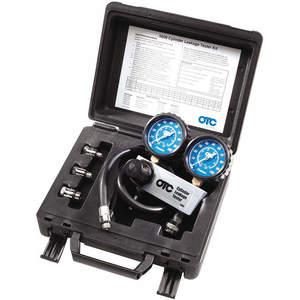OTC 5609 cylinder leakage tester kit is used in automotive maintenance and repair applications. It helps diagnose internal engine issues by measuring the percentage of leakage in the combustion chamber. This tool is ideal for identifying problems like leaking head gaskets and faulty piston rings. It ensures efficient troubleshooting and enables mechanics to pinpoint and address specific engine issues promptly.
Features:
- This kit features dual 2-1/2 inch chrome bezel gauges for precise measurements and enhanced visibility.
- It comes with a tough protective outer boot for added durability and resistance to external impacts.
- This kit includes a pressure-regulated manifold with quick couplers, a long flex 24-inch hose and thread adapters in 10, 12 and 18 mm for versatile and convenient automotive pressure testing applications.
- It is equipped with adapters and blow-molded hard case with a removable lid for secure storage and easy accessibility.
Frequently Asked Questions:
Q. What causes cylinder leakage?
A. A cylinder with low compression but little leakage typically has a valve train issue, such as a worn cam lobe, broken valve spring, collapsed lifter, bent push rod and more. The most likely cause of low compression in all cylinders but minimal leakage is incorrect valve timing.
Q. How long should a cylinder hold compression?
A. Compression should be greater than 100 psi per cylinder with no more than a 10% difference between the highest and lowest readings.
Q. What is acceptable cylinder leakage?
A. Even for normally aspirated engines, respectable leakage figures would range from 8 to 12 percent with a variation between cylinders of 4 to 5 percent (the variation could be as high as 10%).
Q. How do I clean and maintain this OTC 5609 cylinder leakage tester kit?
A.
- After each use, clean OTC 5609 cylinder leakage tester components with a mild solvent to remove oil and debris.
- Inspect the hoses, fittings and adapters for any damage or wear and replace them as needed.
- Ensure that the pressure-regulating manifold is free from blockages or contaminants.
- Store the kit in a dry and cool environment to prevent corrosion and damage.
- Regularly check the pressure gauge for accuracy and replace it if necessary.
- Keep the kit in its case with the removable lid secured to prevent dust and debris accumulation.
Q. What factors should I consider while choosing a cylinder leakage tester kit?
A.
- Ensure compatibility with the cylinder sizes and types you intend to test.
- Choose a kit with a suitable pressure range for your specific application.
- Check that the kit includes a variety of adapters for different cylinder types and sizes.
- Look for a kit made from high-quality materials to ensure durability and longevity.
- Verify if the kit includes a pressure regulator for controlled testing.
- Choose a kit that is user-friendly with clear instructions for easy operation.



